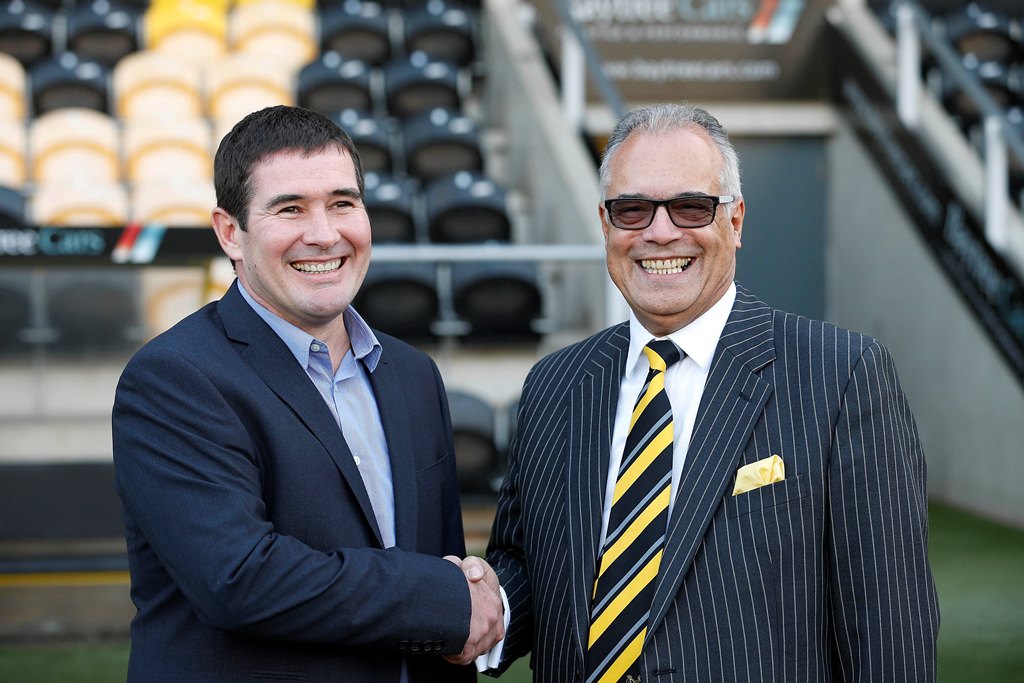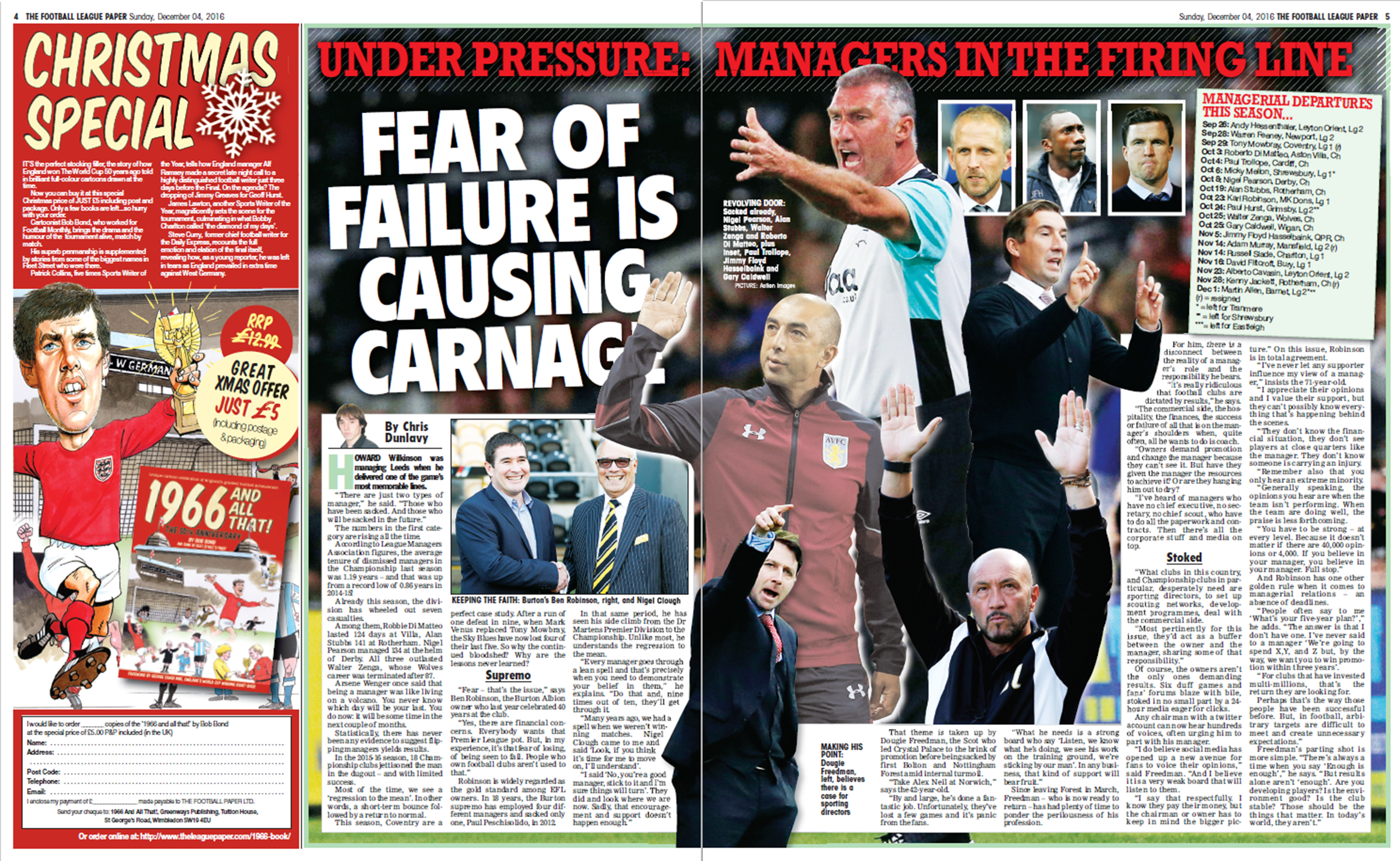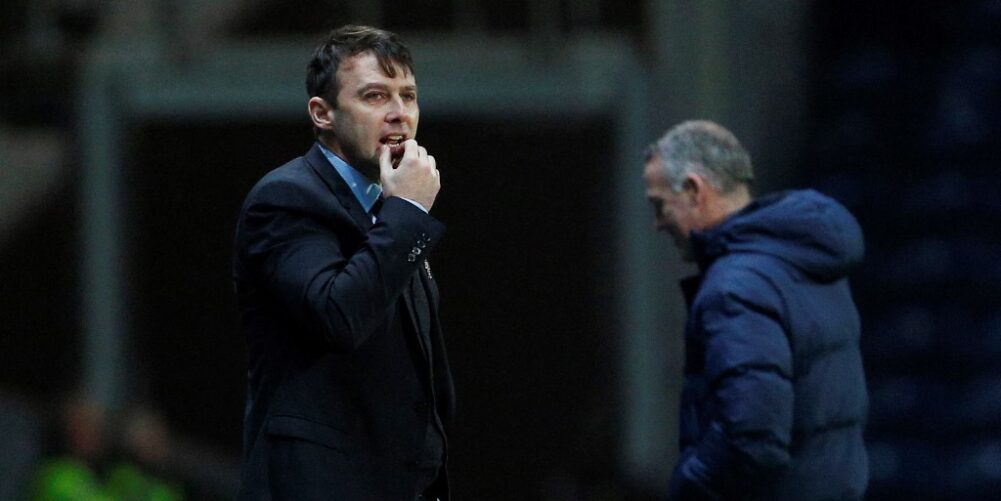(Photo: Action Images)
HOWARD Wilkinson was managing Leeds when he delivered one of the game's most memorable lines.
“There are just two types of manager,” he said. “Those who have been sacked. And those who will be sacked in the future.”
The numbers in the first category are rising all the time.
According to League Managers Association figures, the average tenure of dismissed managers in the Championship last season was 1.19 years – and that was up from a record low of 0.86 years in 2014-15!
Already this season, the division has wheeled out seven casualties.
Among them, Robbie Di Matteo lasted 124 days at Villa, Alan Stubbs 141 at Rotherham. Nigel Pearson managed 134 at the helm of Derby. All three outlasted Walter Zenga, whose Wolves career was terminated after 87.
Arsene Wenger once said that being a manager was like living on a volcano. You never know which day will be your last. You do now: it will be some time in the next couple of months.
Statistically, there has never been any evidence to suggest flipping managers yields results.
In the 2015-16 season, 18 Championship clubs jettisoned the man in the dugout – and with limited success.
Most of the time, we see a ‘regression to the mean'. In other words, a short-term bounce followed by a return to normal.
This season, Coventry are a perfect case study. After a run of one defeat in nine, when Mark Venus replaced Tony Mowbray, the Sky Blues have now lost four of their last five. So why the continued bloodshed? Why are the lessons never learned?
“Fear – that's the issue,” says Ben Robinson, the Burton Albion owner who last year celebrated 40 years at the club.
“Yes, there are financial concerns. Everybody wants that Premier League pot. But, in my experience, it's that fear of losing, of being seen to fail. People who own football clubs aren't used to that.”
Robinson is widely regarded as the gold standard among EFL owners. In 18 years, the Burton supremo has employed four different managers and sacked only one, Paul Peschisolido, in 2012.
In that same period, he has seen his side climb from the Dr Martens Premier Division to the Championship. Unlike most, he understands the regression to the mean.
“Every manager goes through a lean spell and that's precisely when you need to demonstrate your belief in them,” he explains. “Do that and, nine times out of ten, they'll get through it.
“Many years ago, we had a spell when we weren't winning matches. Nigel Clough came to me and said ‘Look, if you think it's time for me to move on, I'll understand'.
“I said ‘No, you're a good manager, stick to it and I'm sure things will turn'. They did and look where we are now. Sadly, that encouragement and support doesn't happen enough.”

That theme is taken up by Dougie Freedman, the Scot who led Crystal Palace to the brink of promotion before being sacked by first Bolton and Nottingham Forest amid internal turmoil.
“Take Alex Neil at Norwich,” says the 42-year-old.
“By and large, he's done a fantastic job. Unfortunately, they've lost a few games and it's panic from the fans.
“What he needs is a strong board who say ‘Listen, we know what he's doing, we see his work on the training ground, we're sticking by our man'. In any business, that kind of support will bear fruit.”
Since leaving Forest in March, Freedman – who is now ready to return – has had plenty of time to ponder the perilousness of his profession.
For him, there is a disconnect between the reality of a manager's role and the responsibility he bears.
“It's really ridiculous that football clubs are dictated by results,” he says.
“The commercial side, the hospitality, the finances, the success or failure of all that is on the manager's shoulders when, quite often, all he wants to do is coach.
“Owners demand promotion and change the manager because they can't see it. But have they given the manager the resources to achieve it? Or are they hanging him out to dry?
“I've heard of managers who have no chief executive, no secretary, no chief scout, who have to do all the paperwork and contracts. Then there's all the corporate stuff and media on top.
“What clubs in this country, and Championship clubs in particular, desperately need are sporting directors, to set up scouting networks, development programmes, deal with the commercial side.
“Most pertinently for this issue, they'd act as a buffer between the owner and the manager, sharing some of that responsibility.”
Of course, the owners aren't the only ones demanding results. Six duff games and fans' forums blaze with bile, stoked in no small part by a 24-hour media eager for clicks.
Any chairman with a twitter account can now hear hundreds of voices, often urging him to part with his manager.
“I do believe social media has opened up a new avenue for fans to voice their opinions,” said Freedman. “And I believe it is a very weak board that will listen to them.
“I say that respectfully. I know they pay their money, but the chairman or owner has to keep in mind the bigger picture.” On this issue, Robinson is in total agreement.
“I've never let any supporter influence my view of a manager,” insists the 71-year-old.
“I appreciate their opinions and I value their support, but they can't possibly know everything that's happening behind the scenes.
“They don't know the financial situation, they don't see players at close quarters like the manager. They don't know someone is carrying an injury.
“Remember also that you only hear an extreme minority.
“Generally speaking, the opinions you hear are when the team isn't performing. When the team are doing well, the praise is less forthcoming.
“You have to be strong – at every level. Because it doesn't matter if there are 40,000 opinions or 4,000. If you believe in your manager, you believe in your manager. Full stop.”
And Robinson has one other golden rule when it comes to managerial relations – an absence of deadlines.
“People often say to me ‘What's your five-year plan?',” he adds. “The answer is that I don't have one. I've never said to a manager ‘We're going to spend X,Y, and Z but, by the way, we want you to win promotion within three years'.
“For clubs that have invested multi-millions, that's the return they are looking for.
Perhaps that's the way those people have been successful before. But, in football, arbitrary targets are difficult to meet and create unnecessary expectations.”
Freedman's parting shot is more simple. “There's always a time when you say ‘Enough is enough',” he says. “But results alone aren't ‘enough'. Are you developing players? Is the environment good? Is the club stable? Those should be the things that matter. In today's world, they aren't.”
*This article originally featured inside The FLP on 4 December 2016.


















